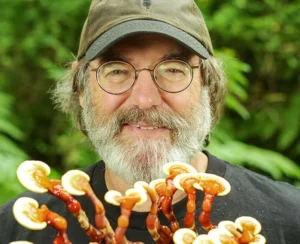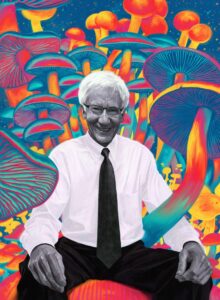Insights from: Psychedelic Science Conference, Denver Colorado 2023. Powered by MAPS
MDMA, ayahuasca, and psilocybin – these substances hold promise not just for individual healing, but for catalyzing collective transformation, offering us an innovative approach to manage and treat mental illnesses. So it’s no wonder that the CEO of Burning Man, NFL Star Aaron Rodgers, Whole Foods Founder John Mackey as well as Founder of philanthropic Tom’s Shoes all made an appearance at the 12,000+ person conference called Psychedelic Science, held in June in Denver, Colorado.
This post captures the main themes and discussions that were prominent at the 2023 conference.
The Potential of Psychedelic Therapy
You may be thinking: drugs, a professional conference? What?! From a legal perspective, at the moment, the U.S. is experiencing state by state decriminalization of psilocybin from states including Colorado, Rhode Island, and Oregon. But the movement truly begins with science.

Burning Man CEO, Marian Goodell flanked by fangirls: me & my conference buddy
With sessions full of scientific talk, Researchers that specialize in studying PTSD, emphasized the need to develop medications that can consistently yield expected outcomes. For instance, advocating for a comprehensive 2 by 2 study involving evidence-based therapies with MDMA, a move which could catalyze a paradigm shift in PTSD treatment. The objective is to demand medications that deliver expected outcomes and provide therapy with fidelity. The paradigm has shifted, presenting an opportunity for evidence-based therapies like MDMA, combined with prolonged exposure, to bring about a new era of healing.
Psychedelic experiences are not merely about ingesting a substance. They provide a unique opportunity for deep introspection. Ayahuasca, a traditional Amazonian plant brewed with powerful psychedelic properties, is becoming increasingly recognized for its potential to facilitate healing and self-discovery. MDMA, used therapeutically, shows promise in treating PTSD, aiding the body’s healing process beyond the influence of the drug itself.
Emergence of a New Branch in Buddhism: Psychedelics
Buddhism, renowned for its integrity for mindfulness and compassion, is witnessing a controversial evolution from practitioner Spring Washam, who has studied with Buddhist Meditations legends such as Jack Kornfield. She declared: a new branch in Buddhism, infused with psychedelic insight, is sprouting. As controversial as it is intriguing, this blend of ancient philosophy and modern discoveries hints at the transformative power of psychedelic substances. As Washam puts it, “It’s dangerous to unleash them [psychedelics] but it’s equally dangerous to not unleash them.”
Embracing the power of the Sangha, or community, we realize that healing is a shared journey. “We need community to heal,” underlines a fundamental truth. By cultivating a community ethos, we develop a robust framework for healing together. This mindset helps redefine ethical standards for healers and encourages an environment of mutual trust, respect, and transformation. In the pursuit of self-discovery and healing, meditation takes center stage during retreats, deepening the experience” – Washam says, “it’s a place where we can stop pretending and challenge how we face suffering”.
Institutional Investment as a Bridge to Psychedelic Beneficiaries
Contrary to skeptics’ views, the profound potential of psychedelics in mental health treatment is being recognized by many, including the National Institute of Mental Health (NIMH). This emerging psychedelic renaissance promises to redefine cultural perspectives on drugs and medicine. As we explore this dynamic field, the focus remains on helping the most people possible, striving for tangible societal changes and healing.
Joshua Gordon, the Director for the National Institute of Mental Health, oversees a budget of over $2 billion and maintains a keen focus on three key areas:
- understanding the biological mechanisms of how drugs work
- ensuring equity in mental health treatment, and
- promoting rigorous research.
Of course, this burgeoning field also presents opportunities for investors. The challenge and allure lie in finding ways to facilitate equitable access to these therapies while creating a sustainable financial model. Innovations like Public Benefit Corporations and the concept of Descending Royalty structures are just the beginning.
Focus on Ethics, Equity and Inclusion to Achieve Transformative Results
The heart of the earth is the Amazon. And the heart of our planet is stirring. A fresh wave of healing and sustainable practices is coursing through our global community, inspiring change in mental health, ethical conduct, and environmental conservation. With this should come an obvious deep respect and praise for indigenous people who have graciously cultivated, and shared these medicines with the rest of the world. Because the rise of the “pop-up Shaman” is diluting tradition in lieu of trend. These medicines are the gifts that the modern, Western world has adopted due to the harm we’ve inflicted; our very own doing.
The surge of interest in psychedelics comes with challenges, notably in the media landscape. The influx of funding and the growth of audiences interested in psychedelics demand responsible reporting. Furthermore, we must ensure equitable access to cost-effective delivery methods, not limiting these opportunities to the wealthy. Research and rigor should guide us on this journey. This includes enforcing a code of ethics for healers and establishing solid rules for community management. As a collective, we must also address the concerns of skeptics and seekers alike, highlighting both the profound possibilities and potential pitfalls of this new era of healing.
With the rise of AI, ethical media practices are also crucial to providing legitimate and reliable information to audiences. It’s crucial to remember that at the heart of this psychedelic journey, our focus remains human potential, social justice, diversity, equity, and inclusion. Lucid News for instance is undergoing an editorial push to make quality content more prominent. While the limelight often focuses on scientific research and financial opportunities, let’s not lose sight of the most crucial aspect: humanity.
Building Brand in Psychedelics
Building business in this space is a deeply meaningful endeavor. There’s a shared future where we not just heal, but heal together. A future where we explore, respect, and nurture the infinite potential of the human mind. After all, as Aubrey Marcus, a renowned wellness expert, expressed, “Purpose is something you feel, that moves you.”
Blake Mycoskie, Founder of Tom’s Shoes, is putting his money where his mind is, having pledged $100 million to support research and prioritizing the well-being of humanity. As Blake highlights, “Let’s help the most people; this is the greatest way to end human suffering.” Ayahuasca, a transformative experience, becomes a soulful encounter—what Blake calls a “date night with my soul.” Fun and philanthropy are intertwining for many celebrity entrepreneurs.

As we tread this new path, we’re guided by a growing body of evidence and a heartfelt commitment to ethical responsibility. Mycologist turned Psychedelic Superstar Paul Stamets encapsulates this beautifully: “We should have our freedom to our consciousness” and the fact that “we have a moral responsibility to guide those we serve with psilocybin.”
Niche communities have emerged such as Moms on Mushrooms to more mainstream with the Zendo project, aiming to elevate and enforce the importance of harm reduction in the psychedelic experience, with an active presence at the infamous Burning Man festival. With more and more voice and communities emerging, it’s clear we are experiencing a need for support and connection as we navigate what’s possible. And having a home base for these conversations and community is key, as holistic wellness startup VIBE aims to achieve. As we weave together the threads of ancient wisdom, modern science, and ethical stewardship, we are shaping a brighter, more compassionate future through community at the heart and collective wellbeing as the goal.
Conclusion

Roland Griffiths, Ph.D., is Professor in the Departments of Psychiatry and Neurosciences at the Johns Hopkins University School of Medicine.
We must bear in mind that this evolution and therapeutic practice is a process, not an event. It’s the continuous deepening of acceptance, the growth of somatic expression, and the gradual integration of new insights into our lives that fuels this movement.
So, are you ready to accept this invitation to transform? Because the future of mental health and sustainability is here, and it’s time to dare greatly. As the Honorary Roland Griffiths, Ph.D., Professor in the Departments of Psychiatry and Neurosciences at the Johns Hopkins University School of Medicine put it: “Isn’t it amazing that we’ve been invited to this party?”
Visit the Conference homepage here.
Read more about MAPS here.


Found in